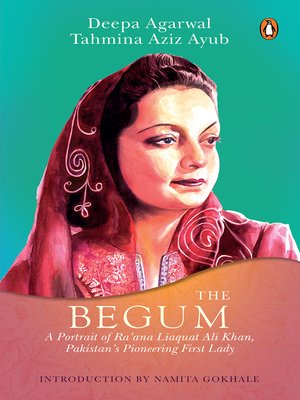The Begum
ebook ∣ A Portrait of Ra'ana Liaquat Ali Khan, Pakistan's Pioneering First Lady
By Deepa Agarwal

Sign up to save your library
With an OverDrive account, you can save your favorite libraries for at-a-glance information about availability. Find out more about OverDrive accounts.
Find this title in Libby, the library reading app by OverDrive.



Search for a digital library with this title
Title found at these libraries:
| Library Name | Distance |
|---|---|
| Loading... |
Begum Ra'ana Liaquat Ali Khan was the wife of Pakistan's first prime minister. She was born Irene Margaret Pant in Kumaon in the early twentieth century. A generation earlier, her family had converted to Christianity, and Irene grew up in the shadow of the Brahmin community's still active outrage. Always intelligent, outgoing and independent, she was teaching economics in a Delhi college when she met the dashing Nawazada Liaquat Ali Khan, a rising politician in the Muslim League and an ardent champion for the cause of Pakistan.
She was immediately inspired by both the man and the idea; they married in 1933 and Irene Pant became Ra'ana Liaquat Ali Khan. In August 1947 they left for Pakistan-led by Liaquat's mentor and friend, Mohammad Ali Jinnah. Ra'ana threw herself into the work of nation building, but in 1952 Liaquat Ali Khan was assassinated-the reasons for his murder are still shrouded in mystery. Ra'ana continued to be active in public life-and her contribution to women's empowerment in Pakistan is felt to this day.
Ra'ana's life story embodies all the major tropes of the Indian subcontinent's recent history. Three religions-Hinduism, Christianity and Islam-had an immense impact on her life, and she participated actively in all the major movements of her time-the freedom struggle, the Pakistan movement, and the fight for women's empowerment. She could see clearly what went wrong after 1947 and wasn't afraid to say so. She spoke out openly against the rise of religious conservatism in Pakistan and the growing role of the army. She was occasionally derided or ignored, but she never gave up. It is this spirit that The Begum captures.
She was immediately inspired by both the man and the idea; they married in 1933 and Irene Pant became Ra'ana Liaquat Ali Khan. In August 1947 they left for Pakistan-led by Liaquat's mentor and friend, Mohammad Ali Jinnah. Ra'ana threw herself into the work of nation building, but in 1952 Liaquat Ali Khan was assassinated-the reasons for his murder are still shrouded in mystery. Ra'ana continued to be active in public life-and her contribution to women's empowerment in Pakistan is felt to this day.
Ra'ana's life story embodies all the major tropes of the Indian subcontinent's recent history. Three religions-Hinduism, Christianity and Islam-had an immense impact on her life, and she participated actively in all the major movements of her time-the freedom struggle, the Pakistan movement, and the fight for women's empowerment. She could see clearly what went wrong after 1947 and wasn't afraid to say so. She spoke out openly against the rise of religious conservatism in Pakistan and the growing role of the army. She was occasionally derided or ignored, but she never gave up. It is this spirit that The Begum captures.







